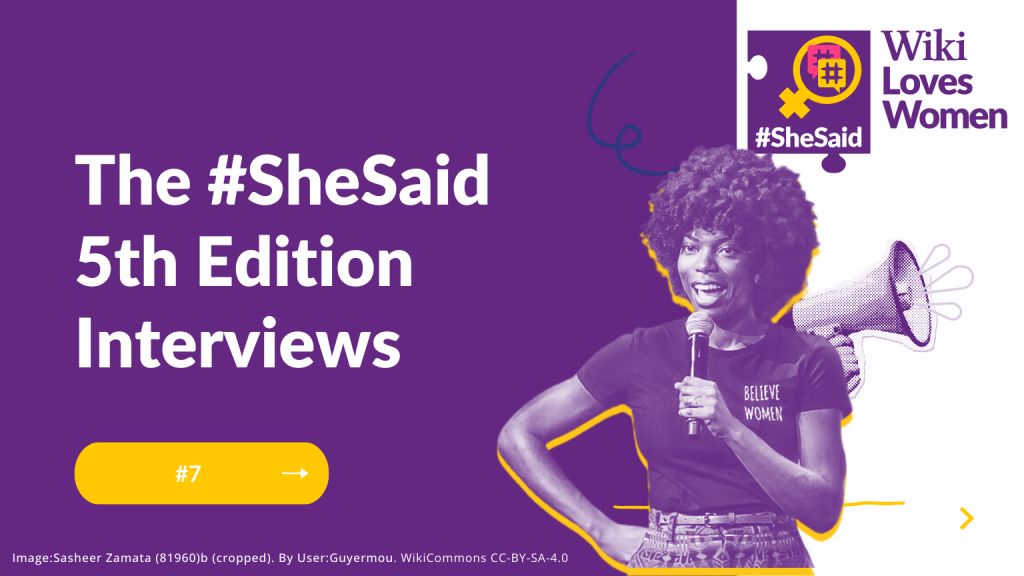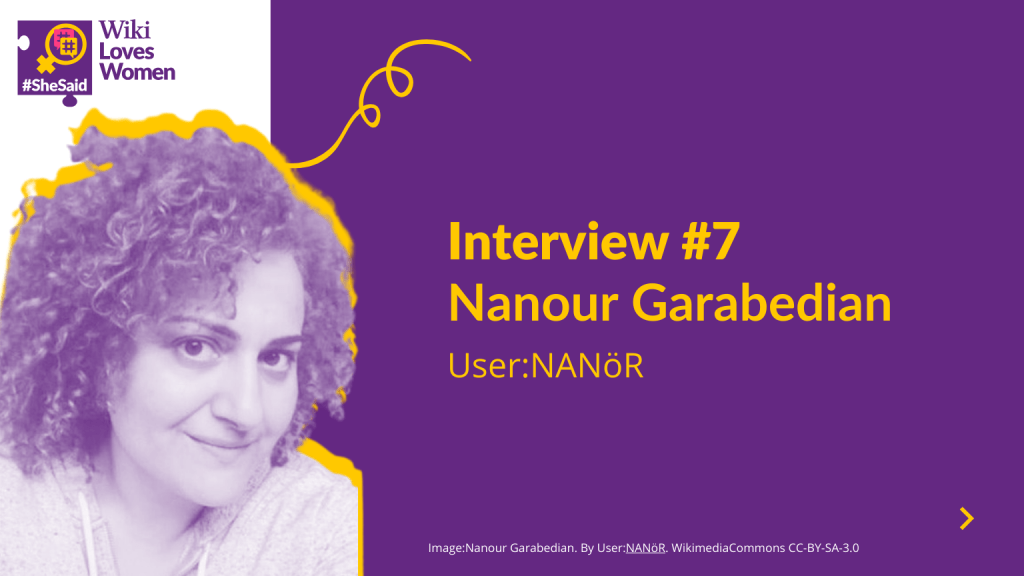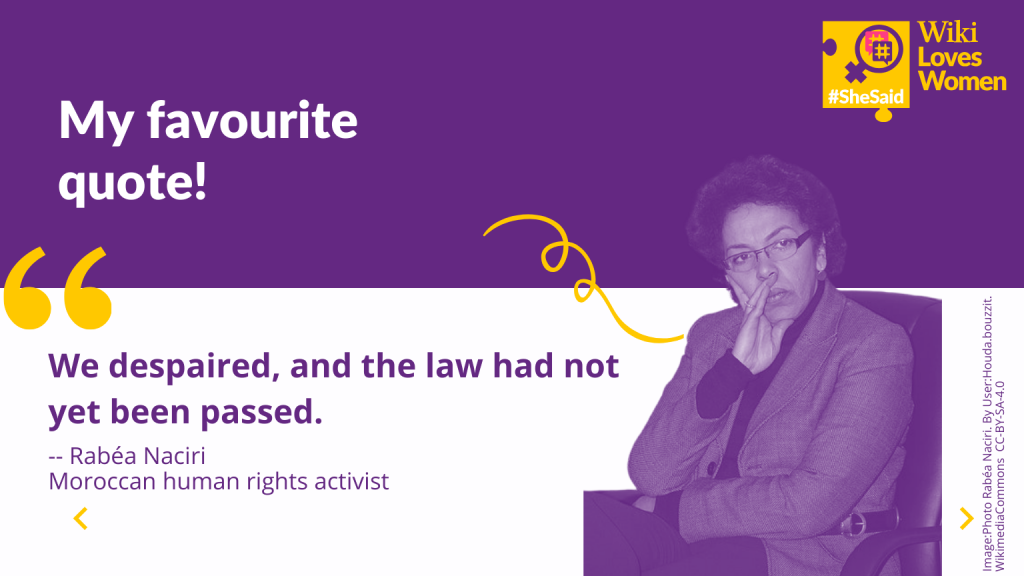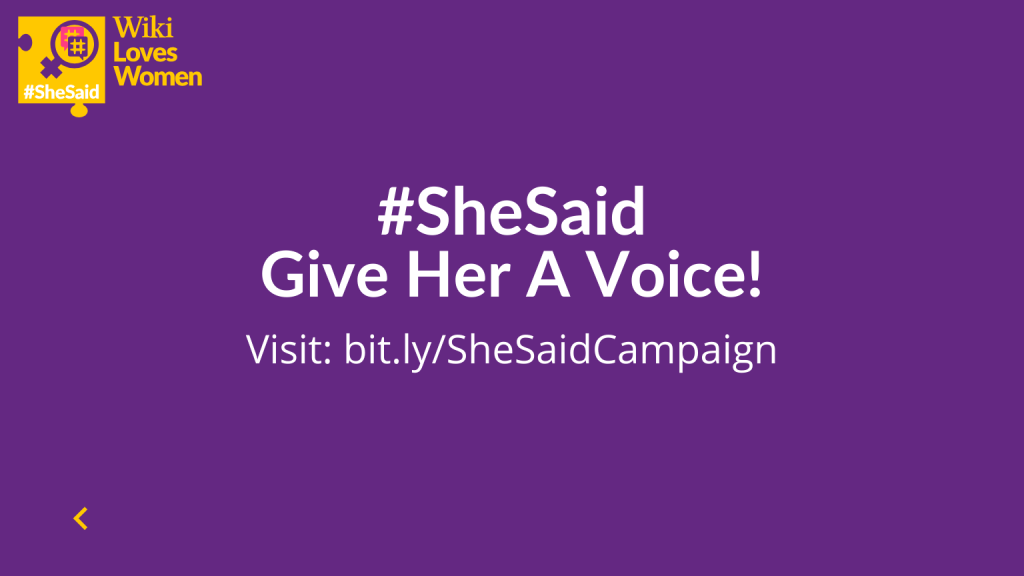In this 7th interview, we are thrilled to spotlight Nanour Garabedian, a passionate advocate for gender representation and the driving force behind the #SheSaid campaign in the Maghreb region. Join us as we delve into Nanour’s journey, her experiences organizing #SheSaid, and her vision for increasing women’s visibility across the Wikimedia platforms.
Could you tell us about yourself?
I am Nanour (User:NANöR), an admin on Arabic Wikisource and a member of the MENA & SSA regional fund committee. I have played a key role in leading workshops to celebrate the 18th anniversary of Arabic Wikipedia, helping raise awareness and encourage engagement. Additionally, I have been instrumental in building and growing the Wikimedia community in Libya, focusing on the sustainability and development of emerging local communities.
Last year marked the first time the Arabic language was included in the #SheSaid campaign. What motivated you to lead this effort?
I’ve led various Wiki projects focused on increasing women’s presence, both in content and in the capacities of editors and organizers. My first Wiki leadership role was with WikiGap, which sparked my passion for creating more space for women’s voices. Joining the #SheSaid campaign was a natural step to amplify women’s perspectives and help bridge the gender gap in knowledge.
How would you assess the current representation of women on Arabic Wikiquote compared to men?
Arabic Wikiquote lacks a sustainable volunteer base, which has impacted women’s representation. Compared to men, women are significantly underrepresented due to limited collective efforts to add content about them. Leading the #SheSaid campaign allowed me to highlight the achievements of influential women from the Maghreb region, ensuring their voices and causes are represented on Arabic Wikiquote.
How do you envision the importance of uniting various Arabic-speaking communities in this year’s campaign?
I envision this year’s campaign as a multi-centered effort, where each Arabic-speaking community can contribute quotes that resonate within their own cultural context. It’s also an opportunity to share skills and build partnerships among communities. Last year’s campaign succeeded in adding quotes from women in the Maghreb region, including Mauritania, where there’s significant need for capacity building.
Can you share your thoughts on the significance of language in fostering collaboration and participation among diverse communities?
Language provides a shared platform where voices from different regions can be recognized and celebrated. It plays a crucial role in facilitating effective communication which is essential for building trust among diverse Arabic-speaking communities.
In the context of the #SheSaid campaign, language plays a crucial role in amplifying the voices of women and promoting gender equality. By translating and sharing quotes from women across different languages, the campaign breaks down linguistic barriers and ensures that the contributions of women from diverse cultural backgrounds are recognized and celebrated globally.
By adding quotes from underrepresented women, we’re not only preserving language but also enriching it with voices and perspectives that inspire wider participation and engagement.
What specific goals do you hope to achieve through this year’s campaign in terms of participation and representation?
This year, I saw a chance to address the gaps I noticed in women’s content on Arabic Wikiquote, especially from underrepresented regions. Last year, I couldn’t run a full campaign, so this time, I’m focusing on bringing in voices from areas like the Maghreb. My goals are simple: boost regional representation, involve more committed volunteers, and add quotes from women across different fields, from science to the arts. By connecting with local communities, I hope we can make lasting progress in closing these gaps.
Have you faced any challenges in organizing the campaign as a group of volunteers on behalf of Maghreb region, and how have you addressed them?
First, building a dedicated team was crucial, as it’s the first time we’re leading this type of initiative. Another challenge was connecting with different communities across the Maghreb region, where there’s limited existing infrastructure for collaboration. To overcome these, we focused on clear communication, defined roles within our team, and reached out to local volunteers and partners in the region. This approach helped us create a coordinated, culturally relevant campaign that resonates with our target communities.
What key lessons have you learned from your involvement in the #SheSaid campaign that you wish you had known at the start?
A key lesson is persistence. Despite facing challenges, obstacles, and unsuccessful endeavors, those women remained committed to their causes and missions. This experience has taught me the value of resilience and the importance of staying focused on our goals, even when faced with adversity.
This experience has deepened my commitment to supporting women’s voices in meaningful ways.
What message would you like to convey to other communities considering joining the #SheSaid campaign?
I’d tell other communities that the #SheSaid campaign is a great chance to highlight women’s voices that often go unnoticed. It’s about giving visibility to the women who have shaped history in their own way. Joining the campaign allows communities to make a real impact by sharing stories that matter and ensuring women’s contributions aren’t forgotten. I encourage everyone not to hesitate in joining this campaign, feeling the drive and positivity it brings, and becoming part of this chorus of women.
What is your favorite women-empowering quote?
My favorite women-empowering quote is by the Moroccan Rabéa Al-Nassiri:
‘We despaired, and the law had not yet been passed.’
Although the quote is somewhat ambiguous, it captures the spirit of struggle and perseverance, even when the desired goal hasn’t been achieved. I had a conversation with a colleague to better understand it, and it deepened my belief in the importance of continuous effort and resilience, even in the face of challenges.
Read more about the campaign and the fifth edition in our #SheSaid 2024 Launch diff and don’t forget to follow us on social media:
- Website: www.wikiloveswomen.org
- Twitter: @Wikiloveswomen
- Instagram: @WikiLovesWomen
- Facebook Page: @WikiLovesWomen
- Facebook Group: Mind The Gender Gap
- Telegram Group: WikiGenderGap

Can you help us translate this article?
In order for this article to reach as many people as possible we would like your help. Can you translate this article to get the message out?
Start translation








